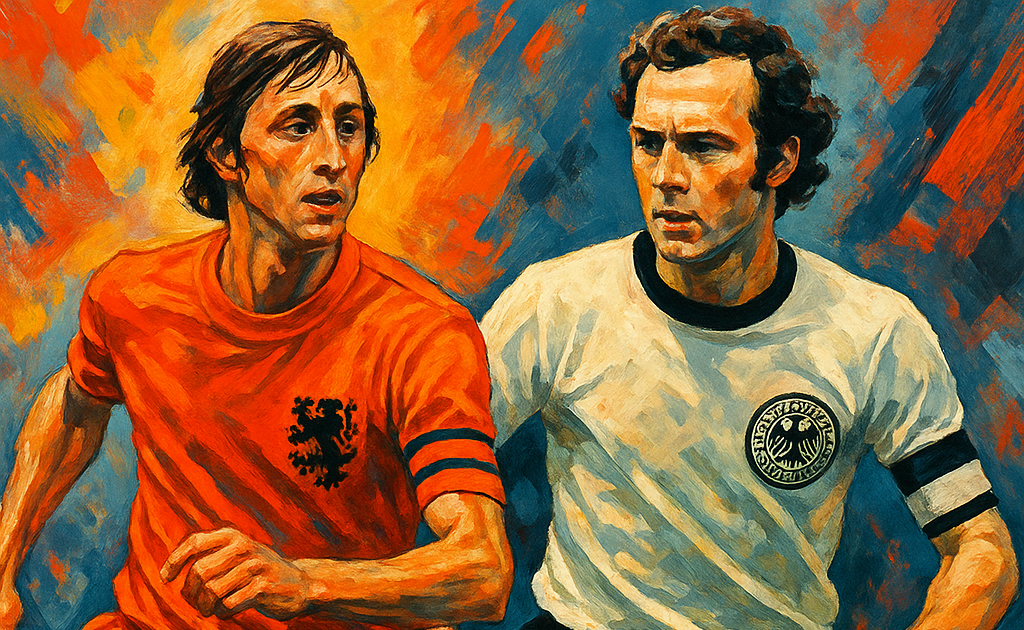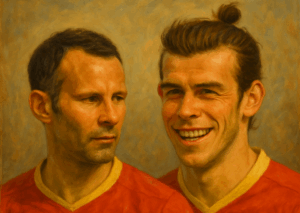
The GOAT of Football Revolution?
The history of football is filled with the names of great players, but only a select few have transcended mere excellence to change the very paradigm of the sport. In the 1970s, the football world became a battleground for two conflicting philosophies presented by two giants. One was the prophet of ‘Total Football’ from the Netherlands, Johan Cruyff. The other was Germany’s ‘Der Kaiser’ (The Emperor), the man who perfected the libero system, Franz Beckenbauer.
If Cruyff was the symbol of attacking, idealistic football, Beckenbauer was the embodiment of pragmatic elegance and ultimate victory. Their rivalry was not just a competition between two players; it was a clash of two different paths to success—an eternal philosophical debate in football between idealism and realism.
1. Clash of the Titans: Two Giants on the Field
Johan Cruyff: The Conductor of Total Football
- Career Highlights: Won three consecutive European Cups with Ajax (1971-1973). After transferring to FC Barcelona, he led a team that hadn’t won La Liga in 14 years to the title. In the final year of his playing career, he moved to rival team Feyenoord and led them to a league and cup double.
- Analysis of Playing Style: He was the on-field brain of ‘Total Football.’ His ability to understand, create, and command space for his teammates was unparalleled.
- His signature move, the ‘Cruyff Turn,’ perfectly encapsulates his football philosophy: simplicity, elegance, and effectiveness.
- He emphasized intelligent football, famously saying, “Technique is not being able to juggle a ball 1,000 times. That’s a circus trick. Technique is passing the ball with one touch, with the right speed, at the right foot of your teammate.”
Franz Beckenbauer: The Creator of the Libero
- Career Highlights: Achieved three consecutive Bundesliga titles (1972-74) and three consecutive European Cups (1974-76) with Bayern Munich. In the twilight of his career, he won another Bundesliga title with Hamburger SV.
- Analysis of Playing Style: He forever changed the concept of a defender with the ‘Libero’ (free man) role.
- His trademarks were his forward dribbles starting from the defensive line and his precise, long-range out-front passes.
- His tackling was an art form based on timing and anticipation, resulting in an extremely low number of yellow cards throughout his career.
A Statistical Comparison: What Do the Records Say?
| Metric | Johan Cruyff | Franz Beckenbauer |
|---|---|---|
| Club Apps / Goals | 713 / 400 | 754 / 98 |
| International Caps / Goals | 48 / 33 | 103 / 14 |
| Ballon d’Or Wins | 3 (1971, 1973, 1974) | 2 (1972, 1976) |
| European Cup Wins | 3 | 3 |
| World Cup Wins | 0 | 1 (1974) |
| European Championship Wins | 0 | 1 (1972) |
Cruyff’s overwhelming goal-scoring record highlights his role as the core of an attacking system, while Beckenbauer’s World Cup and Euros titles demonstrate his leadership in bringing stability and collective success to his team.
2. Tactical Revolutions: Two Philosophers Who Reinvented Football
Cruyff’s Total Football: Space, Movement, and Fluidity
Total Football starts with the concept that any outfield player can take over the role of any other player in the team. The key elements were the creation and exploitation of space, immediate pressing upon losing the ball, and constant positional interchanges. This tactic was a direct and successful challenge to the defensive ‘Catenaccio’ system that dominated Europe at the time.
Beckenbauer’s Libero: Elevating the Art of Defense into Attack
Beckenbauer transformed the defensive role of the ‘sweeper’ into that of an attacking playmaker. As the ‘free man’ positioned behind the defensive line, he was a pioneer who initiated attacks by carrying the ball forward and controlled the game’s tempo from the deepest position. His name itself became synonymous with the position.
3. The Fateful Climax: The 1974 World Cup Final
The Match of the Century: 90 Minutes in Munich
The 1974 World Cup final in Munich was the historic stage where the two philosophies collided head-on. The Netherlands, led by Cruyff, took a 1-0 lead from a penalty just one minute into the match but failed to dominate thereafter. Under Beckenbauer’s command, Germany fought back, turning the game around to 2-1 in the first half and eventually winning the championship.
A Clash of Leadership
This match was a symbolic event where Beckenbauer’s realism triumphed over Cruyff’s idealism. The Netherlands’ high press was neutralized by Beckenbauer’s calm and composed ball distribution. German defender Berti Vogts man-marked Cruyff relentlessly, erasing his influence from the game.
A quote attributed to Beckenbauer himself, “Johan was the better player, but I won the World Cup,” cuts to the heart of this match.
4. Legacy Beyond the Pitch: Manager, Executive, and Icon
Johan Cruyff: Architect of Barcelona’s DNA
As a manager, Cruyff changed the destiny of a club. Leading Barcelona from 1988, he created the ‘Dream Team’ and delivered the club’s first-ever European Cup. More importantly, he instilled his philosophy (possession, positional play) throughout the entire club and revolutionized the youth academy, ‘La Masia,’ into the world’s best.
- Pep Guardiola: “Cruyff built the cathedral. We only maintain it.”
Franz Beckenbauer: ‘Der Kaiser’ Dominates the Football World
Beckenbauer also won the World Cup as a manager in 1990, becoming a legend who conquered the tournament as both a player and a coach. He later became the president of Bayern Munich, transforming the club into a global enterprise. However, corruption allegations surrounding the 2006 Germany World Cup bid, for which he was the organizing committee chairman, have stained his reputation.
A 2025 Perspective: The Imprint on Modern Football
- The Heirs of Cruyff’s Philosophy: His philosophy has become the mainstream in modern football. The ‘Tiki-Taka’ and ‘Positional Play’ implemented by Pep Guardiola are directly rooted in Cruyff’s teachings.
- The Beckenbauer Effect on Defenders: His attacking libero is the prototype for the modern ‘ball-playing defender.’ Today’s top center-backs are required to have the ability to initiate build-up play with precise passing.
In conclusion, Beckenbauer influenced a specific ‘role,’ while Cruyff influenced football ‘philosophy’ itself. In 2025, it is Cruyff’s philosophy that is more widespread and practiced as a complete system, making him arguably the most influential thinker in the history of the game.
Conclusion: The Idealist and The Realist, Football’s Eternal Debate
The rivalry between Johan Cruyff and Franz Beckenbauer symbolizes football’s core dilemma.
Cruyff was the ultimate idealist who believed that how you win is as important as the victory itself. His legacy is a beautiful, living philosophy that continues to evolve today.
Beckenbauer was the ultimate realist and winner, achieving unprecedented success at every level of the game—player, captain, manager, and executive. His legacy is a record of absolute victory and control.
The question of ‘who was greater?’ may be pointless. Their rivalry poses football’s eternal question: Is the ultimate goal victory, or is it the pursuit of a beautiful ideal? The careers of these two legends provide the strongest arguments for both sides, and as long as football is played, their debate will also endure forever.




